MD: Do you have any lasting memories (eg. favourite cabin, horse, etc.)?
Brian: Oh yes – I started out in the Smoky River District, Alfie Burstrom, the Dogmaster, was the former District Warden back in the day on the Smoky, so he took me on my first trip on the Smoky. He had a big influence on me. Alfie stuttered, but you got him in the backcountry, and he didn’t. He would stutter a bit, but nothing like when he was in town. So – got to the Smoky Cabin, Adolphus is beautiful because it’s Mount. Robson, down the Smoky another 18 miles, you come to this beautiful setting. The cabin was built in ’69, and I got to the Smoky, and it was one of those ugly fall days. And got there, and that’s where the phone line ended, coming from Jasper. We had travelled on the Smoky River gravel bars for part of the trip so you got to see some awesome sights. So Smoky became my favourite spot. And Adolphus was beautiful, but when I got to the Smoky, I felt like I was home. And it still is today. When I went back with Eileen in 2010, it was the same feeling when I got there. And as far as horses go, I had tons of horses, but the ones that stand out there are a horse named Fury and my last horse was Chief. Dennis put on a course, and so I got to start Chief as a three-year-old, and he became my bud for a few years.
MD: Do you have any photos of yourself as a warden that you would like to donate to the project?
Brian: I can probably scrounge up a photo somewhere. As far as memorabilia, I don’t…Yes, there’s a few pictures. There’s a few articles that were done about the Warden Service that I was part of. The one that’s in the Reader’s Digest – a lady came from Ottawa, writing for Reader’s Digest. I took her up to Adolphus on horseback, and chatted, and met Sylvia Forest up there. And so the story was about Sylvia, and myself – Sylvia being one of the women in the Warden Service, and so we just talked about the backcountry in Jasper, and relayed a few experiences. And another one was the Jasper Booster – the same old thing, the Wardens would get the…the guys don’t know what we do! So I said to the editor, “Why don’t you come along, and I’ll take you on a horse trip.” So Ron Zinck and Michel Odie, who was Acting Superintendent at the time, and this other fellow went into the Brazeau. And again, it had the centerfold of the big Jasper Booster! And I guess my favourite picture would be – he wrote for the Edmonton Journal, Ed Struzik – and the same thing, Kevin VanTighem and I took Ed up to Willow Creek and Little Heaven, and it’s in the fall. And that was going into the big change, where the science was coming in, and the guns were coming – so it was interesting. So Kevin and I took him on a trip, and got this huge picture in the Edmonton Journal. My sister-in-law at the time, “Brian! Brian! You’ve got to look at this!” I said, “Oh…OK.” We had fun in the Warden Service, and John Strachan was an artist and cartoonist. And another fellow who worked for Marmot, a lift operator, and (Derek Hammell). The two of them would come up with these hilarious cartoons. Deke was the one who had the bear cartoon of me. (based on black bear in the Chief Warden’s office). So at Marmot, we wanted to start a little bit of an education type thing. And so the two of them got together, and all the different stuff about the ski hill and avalanches – they made a book, I wish I could find it. And we made several copies of this book. What a better way to learn than fun and creative stuff. So John (Strachan) is another one that stands out, and he’s passed away as well.
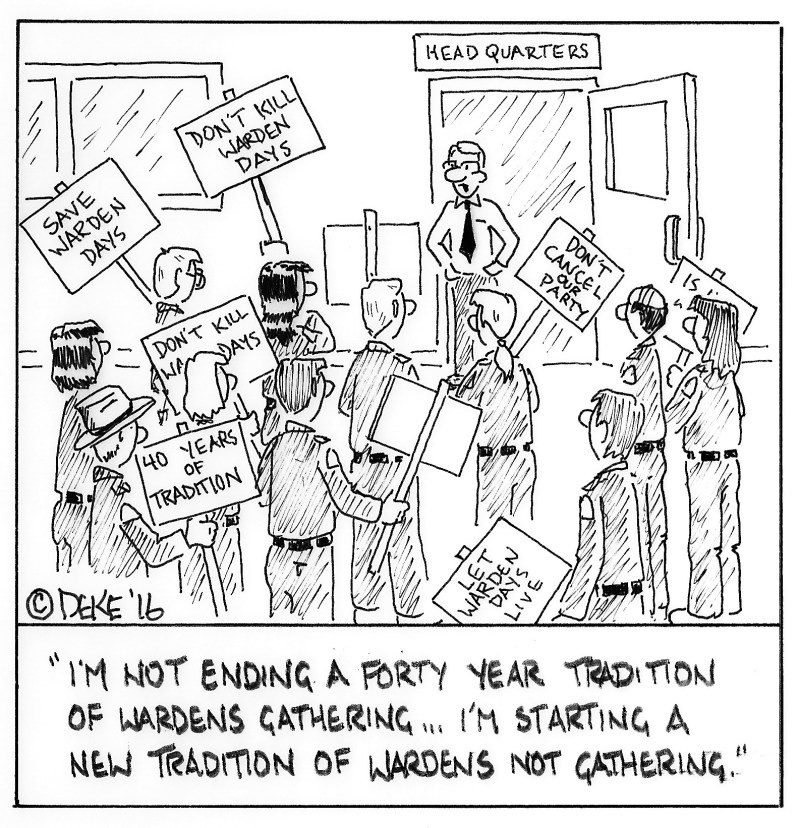
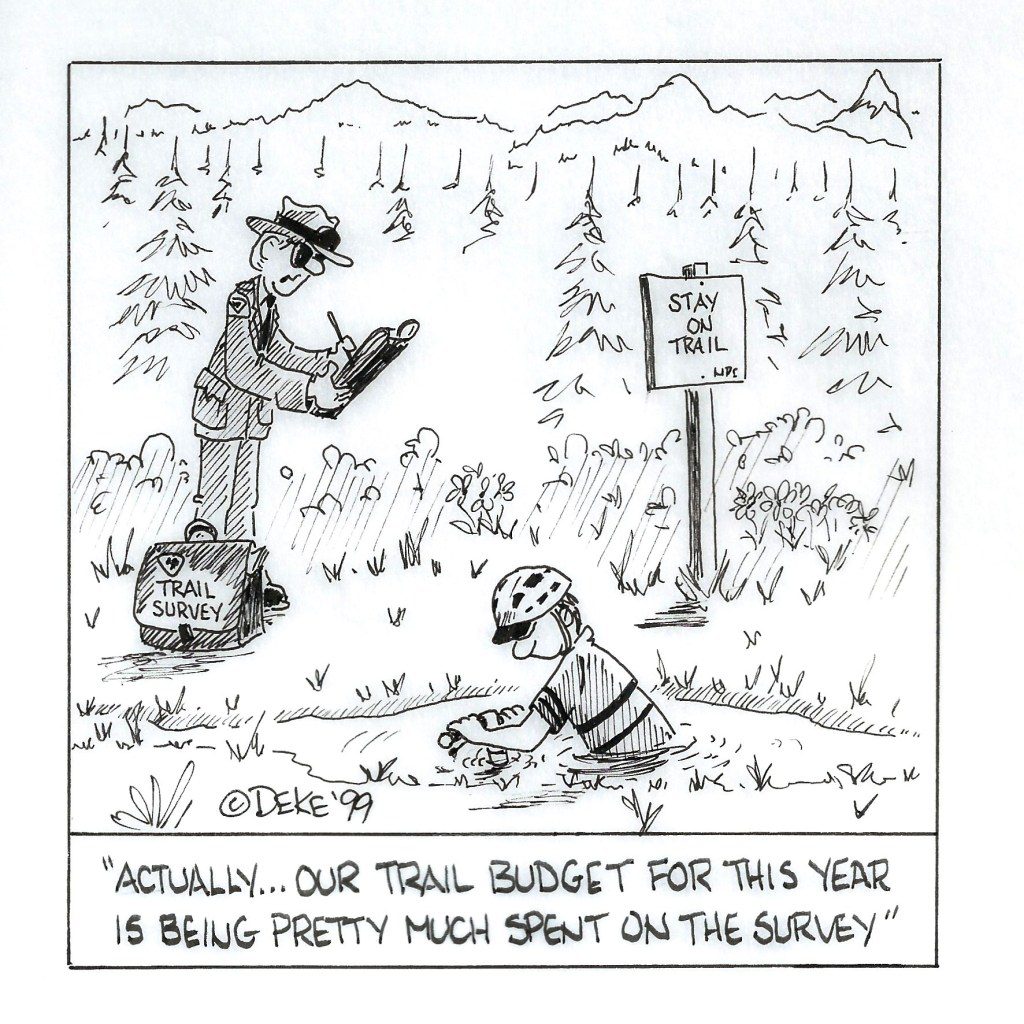
MD: What year did you retire? And what do you enjoy doing in retirement?
Brian: I retired in January, 2005. Immediately that spring, I got a job helping run a horse camp in the Tonquin Valley. So I guided in there for two years. It was a busy time, because I did five-day trips – so in 5 days, out the fifth day, re-supply, back in the next day. So there’s 31 days in the month, and you’d get one day off – sort of. But what was going on there, was we had this property at McBride, and I loved my little farm and horses. So I worked for two years in Tonquin. It was a good experience. And again, I just loved the people – I just had fun with people (at the Tonquin). So (Vicki Wallace) and I split up in 2008, and divorce followed in 2010. Eileen and I hooked up, and our horse herd grew to 9! We did lots of long trips – 2 to 3-week trips into the backcountry. We both love it. In 2009 or so, I was sitting there and I thought you know – there’s lots of horses in this country, lots of cowboys – lots of people that love horses, and lots of trails. But the trails – at that time, the BC government had backed off from the recreation world, and the trails weren’t getting cleared. And I’m not very computer literate, but I got on the computer, and looked up Horse Clubs around BC. And I came across this “Backcountry Horsemen of BC” and looked up their stuff, and thought, “Yeah! This would be alright.” So I called a little meeting in our log house, and I couldn’t believe the number of people that came. There must have been 25 people just from around McBride. And so the idea was “Shall we form a club…?” and it was unanimous that we should form this club. “Well, who’s going to be the chair of this club?” “Well, you started this, Brian, so..!” So then we joined the Backcountry Horsemen of BC, and a couple of years later, I became the President of the Backcountry Horsemen of BC. And it’s really a rewarding…again, we’ve got between 800 or 900 people, and 22 chapters now, and all over the country from Terrace to Cranbrook to the (Vancouver) Island. And so, we’re making a difference, and we’re getting lots of stuff done. We’re keeping the trails open for multi-use, not just for horses. And so that, I’ve enjoyed. This May – you’re allowed to have three two-year terms – I’m on my last (or third) term. So it’s been 6 years.
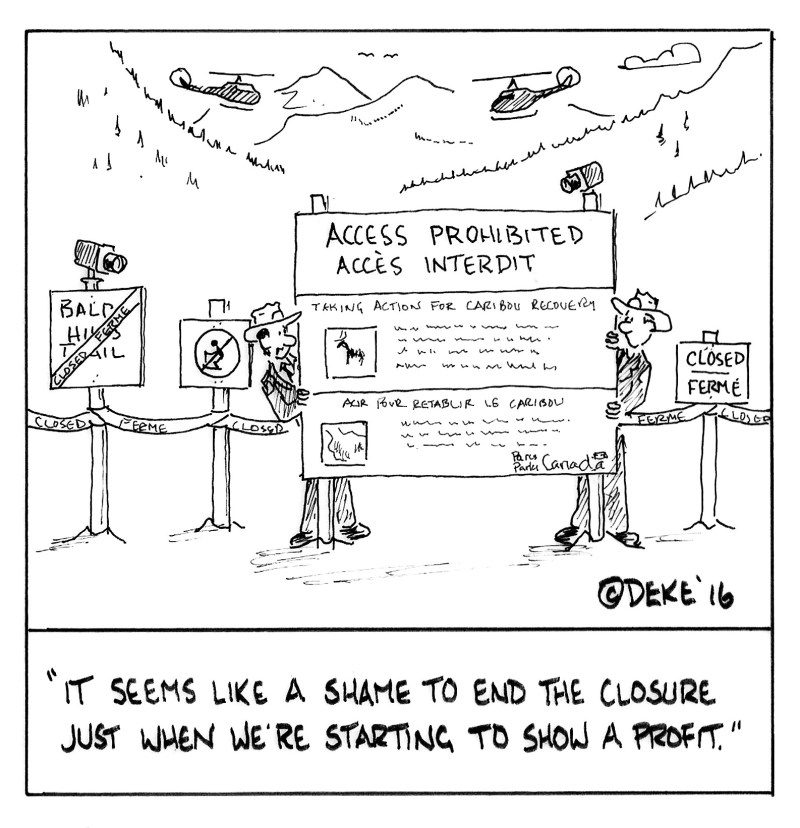
MD: So what after this?
Brian: Oh – we’ve got lots going on at McBride with our stuff. (and regarding horse trips) It’s always interesting the people you run into in the backcountry! Last year, we thought we’d make it easier, because my knees were not all that great, and so we went up the Blue Creek Valley. We were just setting up camp, and an outfitter came in and we know him quite well, and I spoke about Ron Langevin – well, his two daughters were on that trip. And I don’t remember the two daughters as they were younger, but they remembered me. And so it was like an old homecoming to them, because that’s where Ron Langevin was the Blue Creek District Warden, so I could tell them lots about what he did out there. So that was really neat. Actually,Toni Klettl’s wife, Shirley, was a relation with these two, and so we could share lots. And they sent Loni (Toni’s daughter) some pictures of running into Eileen and I up at the Natural Arch, so it’s a small world.
MD: Is there anything that I haven’t asked you that you want people to know about the Warden Service?
Brian: I lived in a really fortunate time – I really did. The career I had – when I look back on it – there’s very few things that come to mind – the desk, of course, but overall it was just a fantastic career. And making a difference.
MD: So you were saying it was the opportunity to make a difference…
Brian: I think I did…and the long-lasting relationships after you retire are there. Like John Niddrie – we took that trip, the year of the warden service (reunion?) where we rode in from the Ya Ha Tinda to Banff, and got to ride down Banff Avenue. That was in 2008 or 2009? (2009 was the 100th Anniversary of the Warden Service) That was good, because there was some of us old farts, and there was some of the people like John Niddrie and Dave Norcross were on that trip. There were quite a few of us. And the last camp we stopped at, we got a campfire going that night, and had a few drinks around the campfire, and kind of went around the campfire, saying the people that stood out, and what the warden service meant to you, and that all kind of stuff. At that time, John and Dave both spoke of their memories that they had under my tutorship. So those types of things mean more than all the money and all the rest of it that you do over the years. It’s the effect that you had on people. That’s what it’s all about. The job has to be done, but there’s different ways of getting the job done. Sometimes you have to throw in a little humour, and I could always get in there and liven up the…,And your husband (Dave) is the same. (laughs) And once I moved up to becoming the Chief Park Warden, and going to meetings, and meeting people like Dave, and there’s others where you just kind of click. And we talked about law enforcement – towards the end, Terry Blouin, from the east, was a Superintendent, and I, from the west, – this is from the time when all of the parks were writing law enforcement plans, and this is before the gun thing really blew up. We were charged with, first of all, holding little sessions with the Superintendents – we did one out west, and one down east to kind of explain to them what law enforcement meant, and what their responsibilities were. Because at the time – this is where it got away, I think – is that the Chief Park Wardens and the wardens themselves, they sort of built up this law enforcement program, and so one of Terry’s and my job, and Peter Whyte was involved, was to go around to all these different parks in Canada, and help them point their law enforcement plan the way that Ottawa wanted it. And so Terry was in charge of the east, and I was in charge of the west, and we’d get together every once in a while. And I got to go wherever – Riding Mountain, Prince Albert, all those parks – up to Kluane, out to the east. And the park that really stood out as far as firearms went, and there’s a couple down east, was Riding Mountain, because of what they were dealing with down there – with the type of people around the park (dealing with poaching). So that was a great time – lots of time spent, and Terry and I became very good friends as well, because we were going through all of this stuff (together). I spent two or three years on the law enforcement issue. As far as superintendents go, Ron Hooper was one of the best that I had to work with.
MD: Well, that’s awesome, Brian. Thank you so much for coming in and telling me everything you’ve covered. It’s just been amazing.
Brian: So – what I have to know is – do I get the job?
MD: You do!
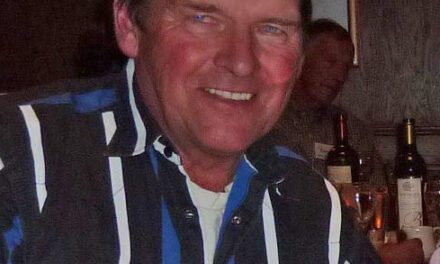
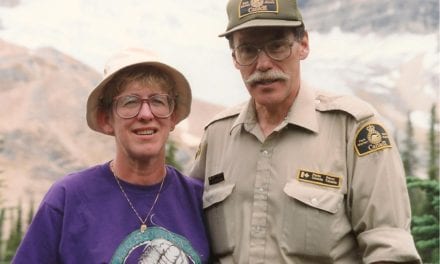
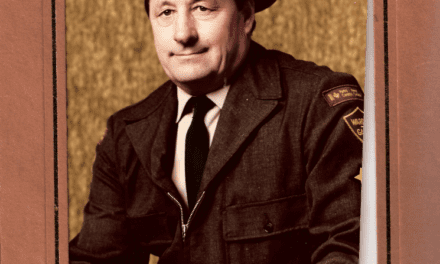
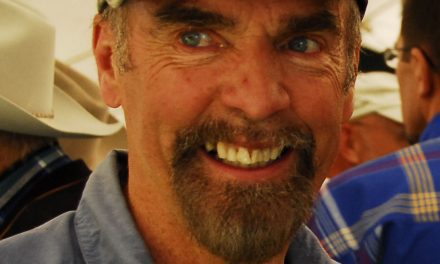
Recent Comments